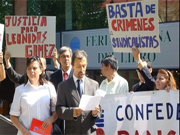News
UNI says Colombia must do more to protect trade unionists

In anticipation that US President Obama and Colombian President Santos will announce today a plan to clear the way for the passage of a free trade deal between the countries, UNI Global Union said the Colombian government must do more to protect trade unionists and worker rights.
This week the UNI Americas Executive Board took place in Bogota, Colombia, while intense negotiations were underway between the US and Colombian governments over the free trade agreement and improvements in Colombian labour law.
Before the meeting, UNI General Secretary Philip Jennings met with workers in Bogota to hear their stories about being trade union members in Colombia.
“We were moved and shocked by the stories from workers,” Jennings said. “The message on the ground is that nothing has changed. Threats, murder and union busting continue. We see that a new political space may have opened but it needs to spread to the world of work.”
Jennings called on global business leaders to “clean up their act in Colombia.”
In order to pave the way for the stalled trade deal with the US, the Colombian government has said it will change its labour laws. Colombian Vice President Angelino Garzón’s representative, Oscar Gutiérrez, spoke at the UNI board meeting, promoting this message of change.
Gutiérrez said the government is committed to the development of social dialogue and will bring its laws into compliance with International Labour Organisation statutes. It will devote more resources to protection of trade union leaders, launch a new national dialogue on respect for human rights and will change laws on outsourcing and the use of labour cooperatives, which have brought massive worker abuse as workers lose their employee status and become self-employed through the legal fiction of cooperatives.
Garzón later held a lengthy meeting with Jennings and a small number of UNI and Colombian union representatives. He promised to meet with UNI’s 13 affiliates and to work with them on their agenda. The Colombian unions also said they are ready to meet with the government. The Vice President also promised to release the results of an investigation of the murder of banking trade unionist Leonidas Gomez Rozo to the Colombian bank workers union UNEB.
Garzón embraced UNI’s demand that Colombia must change the rules of the game for multinational companies and other employers in Colombia who flout labour rules through the use of labour cooperatives and labour pacts that offer better conditions to workers if they agree to abandon union membership.
“The changes in labour law we expect will be positive steps but this will not be enough to give Colombia a clean bill of health on labour issues,” Jennings said. “More progress needs to be made to free people from fear. Colombia has a long way to go to remedy its legacy of violence.”

